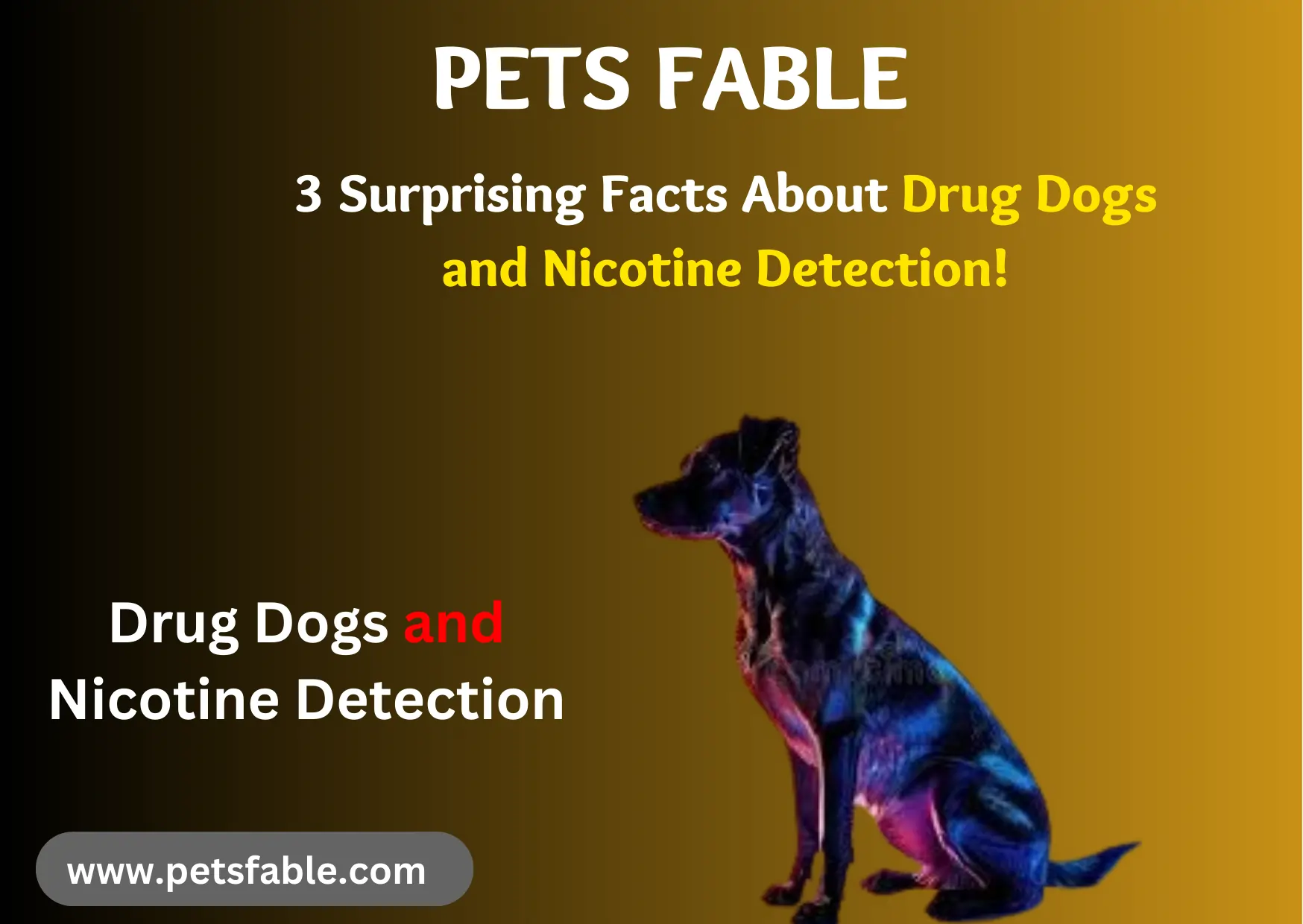Can Drug Dogs Detect Nicotine?
Drug dogs possess an extraordinary ability to sniff out various substances, including nicotine, thanks to their highly sensitive sense of smell.
These dogs can detect even minimal traces of substances they are trained to find. However, it's important to note that the training of drug dogs is typically focused on specific substances that are relevant to their duties, such as illegal drugs or explosives.Therefore, not every drug dog will be trained to detect nicotine unless it is specifically required for their operational tasks.
Can Drug Dogs Smell Nicotine?
Drug detection dogs play a crucial role in enhancing security and health safety across various settings, including airports, schools, and border controls.
Their exceptional sense of smell enables them to identify a wide array of substances, raising questions about their ability to detect nicotine.

Personal Experience at School
In my high school, the tension during random canine checks was palpable. These checks targeted illicit items, yet my nicotine device remained undetected.
This experience suggested that the dogs were not trained to sniff out nicotine, focusing instead on more traditional contraband like drugs and explosives.
Can Drug Sniffer Dogs Detect Vapes and Nicotine Products?
While these canines have the potential to detect nicotine and vapes, their training typically concentrates on illegal drugs such as heroin and cocaine. Nicotine detection is less common and usually only implemented in specific contexts, such as schools where there’s a concern about teen vaping.
Key Insights
Training Focus:
The training of drug dogs often prioritizes illegal substances. Nicotine detection is incorporated based on specific requirements of the training agency, reflecting a strategic approach to their skills deployment.
Practical Application:
Although capable of detecting nicotine, the practical use of this ability is usually confined to particular scenarios. Leaving nicotine products at home is a reliable method to avoid detection during searches.
Read more: Drug Sniffer Dogs Detect Vapes and Nicotine ProductsNuanced Training:
These dogs are trained to signal various scents to their handlers, demonstrating their refined ability to differentiate between numerous odors, including legal substances like nicotine, when properly trained.
Signs That Dogs Can Detect Nicotine
Drug dogs are trained to exhibit certain behaviors when they detect a scent, which can include:
| Behavioral Cue | Description |
|---|---|
| Staring and Alertness | Indicative of detecting a specific scent. |
| Pacing and Sniffing | Common behaviors when a dog is tracing a smell. |
| Body Freezing and Tense Jaw | Signs of focusing on a particular scent. |
| Paw Raised and Ears Up | Classic indications of scent detection. |
| Other Behavioral Cues | Various other behaviors that may indicate a dog is detecting or tracing a scent. |
Excited Behavior and Circling:
These actions may occur if a dog senses something like a Jul.
Focused Attention and Pawing At An Object:
Further signs of scent recognition.
These behaviors highlight the sophistication of their training and their capability to identify various substances, underlining the specialized nature of their roles in security and public health contexts.
Understanding Canine Olfaction and Nicotine Detection
Drug dogs have an extraordinary olfactory capability, scientifically proven to be up to 100,000 times more sensitive than humans. Breeds like Bloodhounds and German Shepherds are especially renowned for their sniffing abilities.
Their advanced nasal structure, which divides air into separate channels for breathing and scent analysis, along with a specialized vomeronasal organ, enhances their detection abilities.
Although not all drug dogs are trained to detect nicotine, their ability to do so depends on their specific training regimen, which focuses primarily on priorities like illegal drugs or explosives.
Capabilities of Drug Dogs
Drug dogs are incredibly effective in various scent detection roles, thanks to their separate pathways for processing scents and a specialized organ for pheromone detection.
Read more: is-rotisserie-chicken-safe-for-dogs-5-myths-debunkedThese dogs are trained extensively to detect a range of scents, including illegal drugs and potentially nicotine, if it is deemed necessary for their field of work.
Their training involves using toys that mimic the smells they need to detect, preparing them for real-world tasks such as identifying explosives or narcotics.
Training and Application
The training process for drug dogs is rigorous. They learn to identify specific scents, including those from illegal drugs and potentially legal substances like nicotine, depending on their deployment scenarios.
For instance, while the primary focus at road checkpoints might be to detect illegal substances, the dogs’ ability to sniff out nicotine in vehicles theoretically exists but is not usually a training focus unless specifically required.
Preventing Detection of Nicotine

Hiding nicotine products from drug-sniffing dogs generally involves leaving them behind, as any attempt to mask the scent might not be foolproof. Common methods like wrapping items in plastic or using strong odors like vinegar might not effectively deceive trained dogs and could damage the product.
Comprehensive Training for Substance Detection
Training a dog to become proficient in scent detection includes basic commands, positive reinforcement, and using rewards like treats and toys.
Read more: 4-important-facts-about-water-and-parvo-in-dogsHandlers meticulously train dogs to respond to various commands essential for identifying specific narcotics and potentially other substances like nicotine. The training emphasizes distinguishing between multiple scents, a skill that extends to legal substances under certain conditions.
Certification and Standards
Achieving certification as a sniffer dog involves passing controlled tests that assess their ability to identify specific scents in various environments.
The National Narcotic Detector Dog Association, among others, sets these rigorous standards, underscoring the vital role of trained dogs in security and law enforcement.
Conclusion
The capability of drug dogs to detect nicotine showcases their versatile training and exceptional olfactory skills. While not all drug dogs will sniff out nicotine, their potential to do so underlines the adaptability and comprehensive nature of their training.These canines remain invaluable in maintaining safety and security, illustrating the profound connection between humans and these adept animals in striving for a safer society.
FAQs: Drug Dogs and Nicotine Detection
Can a drug dog smell a nicotine vape?
Yes, if the vape contains illicit substances that the dog has been trained to detect. However, if it only contains nicotine, specialized training would be needed for detection.
Do dogs like the smell of nicotine?
Dogs, with their superior sense of smell, may find the odor of tobacco smoke particularly unpleasant. Additionally, second-hand smoke can exacerbate respiratory issues like bronchitis and asthma in pets.
What drugs can dogs not smell?
Dogs are generally not trained to detect drugs like morphine, which are legally prescribed, despite their ability to smell opiate-based narcotics.
Why do dogs hate nicotine?
Dogs and other pets are more sensitive to nicotine, which can be toxic to their neurological systems, making them particularly vulnerable to its effects.
Can drug dogs smell through vacuum-sealed bags?
Even though vacuum sealing reduces odor leakage, trained detection dogs can still identify substances within vacuum-sealed packages, proving that this method is not foolproof.
Can any dog be trained as a drug-detection dog?
Not every dog is suited for drug-detection training. Success depends on the dog’s natural abilities, temperament, and the rigorous demands of the training process.
How long does it take to train a dog to detect drugs, including nicotine?
Training a dog to detect drugs, including nicotine, can take several weeks to months, depending on the dog’s initial capabilities and the complexities of the training program.
Are there limitations to what drug dogs can detect?
Yes, the effectiveness of drug dogs can be limited by factors such as the specificity of their training, scent environment complexity, and the physical properties of the substances.
What happens when a drug dog detects a substance like nicotine?
When a drug dog detects nicotine or another substance, it signals its handler with specific behaviors like sitting or barking, prompting further investigation.
How accurate are drug dogs in detecting nicotine compared to other substances?
Drug dogs can be highly accurate in detecting nicotine if they are specifically trained for it, though their effectiveness can vary with environmental factors and the dog’s experience.

